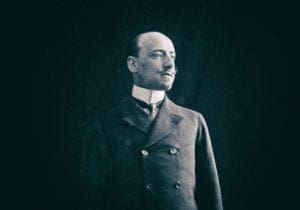
La letteratura inglese è una delle più amate e famose al mondo, che vanta numerosi scrittori conosciuti e studiati in tutto il mondo.
Tra questi non possiamo dimenticare le tante opere di poesia che hanno contribuito a rendere la lingua inglese così amata.
Ecco quindi le più belle e famose poesie in inglese (con traduzione in italiano) da conoscere assolutamente. Scoprile subito!
Poesie in inglese
- Sonnet 18
(William Shakespeare)
Shall I compare thee to a summer’s day?
Thou art more lovely and more temperate:
Rough winds do shake the darling buds of May,
And summer’s lease hath all too short a date;
Sometime too hot the eye of heaven shines,
And often is his gold complexion dimm’d;
And every fair from fair sometime declines,
By chance or nature’s changing course untrimm’d;
But thy eternal summer shall not fade,
Nor lose possession of that fair thou ow’st;
Nor shall death brag thou wander’st in his shade,
When in eternal lines to time thou grow’st:
So long as men can breathe or eyes can see,
So long lives this, and this gives life to thee.
Traduzione:
Sonetto 18
(William Shakespeare)
Dovrei paragonarti a un giorno d’estate?
Tu sei più incantevole e più mite.
Impetuosi venti scuotono le tenere gemme di maggio,
E il corso dell’estate ha fin troppo presto una fine.
Talvolta troppo caldo splende l’occhio del cielo,
E spesso la sua carnagione dorata s’oscura;
E ogni bellezza talvolta dalla bellezza decade,
sciupata per caso o per il mutevole corso della natura.
Ma la tua eterna estate non svanirà,
Né perderai possesso della tua bellezza,
Né la morte si vanterà che tu vaghi nella sua ombra,
poiché tu cresci nel tempo in eterni versi:
Finché uomini possono respirare o occhi possono vedere,
fino ad allora vive questa poesia e ti dà vita. - She Walks in Beauty
(Lord Byron)
She walks in beauty, like the night
Of cloudless climes and starry skies;
And all that’s best of dark and bright
Meet in her aspect and her eyes;
Thus mellowed to that tender light
Which heaven to gaudy day denies.
One shade the more, one ray the less,
Had half impaired the nameless grace
Which waves in every raven tress,
Or softly lightens o’er her face;
Where thoughts serenely sweet express,
How pure, how dear their dwelling-place.
And on that cheek, and o’er that brow,
So soft, so calm, yet eloquent,
The smiles that win, the tints that glow,
But tell of days in goodness spent,
A mind at peace with all below,
A heart whose love is innocent!
Traduzione:
Cammina, lei, nella bellezza
(Lord Byron)
Cammina, lei, nella bellezza, come la notte
Di climi senza nuvole e cieli stellati;
E tutto ciò che è meglio del buio e del luminoso
Incontra nel suo aspetto e nei suoi occhi;
Così addolcito da quella tenera luce
Che il cielo al giorno sgargiante nega.
Un’ombra in più, un raggio in meno,
Aveva mezzo compromesso la grazia senza nome
Che ondeggia in ogni treccia di corvo,
O si schiarisce dolcemente sul suo viso;
Dove i pensieri serenamente dolci esprimono,
Com’è pura, com’è cara la loro dimora.
E su quella guancia, e su quella fronte,
Così dolce, così calmo, ma eloquente,
I sorrisi che vincono, le tinte che brillano,
Ma racconta di giorni in bontà trascorsi,
Una mente in pace con tutto il sotto,
Un cuore il cui amore è innocente! - O Captain! My Captain!
(Walt Whitman)
O Captain! my Captain! our fearful trip is done;
The ship has weather’d every rack, the prize we sought is won;
The port is near, the bells I hear, the people all exulting,
While follow eyes the steady keel, the vessel grim and daring;
But O heart! heart! heart!
O the bleeding drops of red,
Where on the deck my Captain lies,
Fallen cold and dead.
O Captain! my Captain! rise up and hear the bells;
Rise up – for you the flag is flung – for you the bugle trills;
For you bouquets and ribbon’d wreaths – for you the shores a-crowding;
For you they call, the swaying mass, their eager faces turning;
Here Captain! dear father!
This arm beneath your head!
It is some dream that on the deck
You’ve fallen cold and dead.
My Captain does not answer, his lips are pale and still;
My father does not feel my arm, he has no pulse nor will;
The ship is anchor’d safe and sound, its voyage closed and done;
From fearful trip the victor ship comes in with object won;
Exult, O shores, and ring, O bells!
But I with mournful tread
Walk the deck my Captain lies,
Fallen cold and dead.
Traduzione:
O capitano! mio capitano!
(Walt Whitman)
O Capitano! mio Capitano! il nostro viaggio tremendo è terminato;
la nave ha superato ogni ostacolo, l’ambìto premio è conquistato;
vicino è il porto, odo le campane, tutto il popolo esulta,
mentre gli occhi seguono l’invitto scafo, la nave arcigna e intrepida;
ma o cuore! cuore! cuore!
o gocce rosse di sangue,
là sul ponte dove giace il mio Capitano,
caduto, gelido, morto.
O Capitano! mio Capitano! risorgi, odi le campane;
risorgi – per te è issata la bandiera – per te squillano le trombe,
per te fiori e ghirlande ornate di nastri – per te le coste affollate,
te invoca la massa ondeggiante, a te volgono i volti ansiosi;
ecco Capitano! amato padre!
questo braccio sotto il tuo capo!
è solo un sogno che sul ponte
sei caduto, gelido, morto.
Non risponde il mio Capitano, le sue labbra sono pallide e immobili;
non sente il padre mio il mio braccio, non ha più energia né volontà;
la nave è all’ancora sana e salva, il suo viaggio concluso, finito;
la nave vittoriosa è tornata dal viaggio tremendo, la meta è raggiunta;
esultate, coste, e suonate, campane!
mentre io con funebre passo
percorro il ponte dove giace il mio Capitano,
caduto, gelido, morto. - Because I could not stop for Death
(Emily Dickinson)
Because I could not stop for Death –
He kindly stopped for me –
The Carriage held but just Ourselves –
And Immortality.
We slowly drove – He knew no haste
And I had put away
My labor and my leisure too,
For His Civility –
We passed the School, where Children strove
At Recess – in the Ring –
We passed the Fields of Gazing Grain –
We passed the Setting Sun –
Or rather – He passed Us –
The Dews drew quivering and Chill –
For only Gossamer, my Gown –
My Tippet – only Tulle –
We paused before a House that seemed
A Swelling of the Ground –
The Roof was scarcely visible –
The Cornice – in the Ground –
Since then – ’tis Centuries – and yet
Feels shorter than the Day
I first surmised the Horses’ Heads
Were toward Eternity –
Traduzione:
Poiché non potevo fermarmi per la morte
(Emily Dickinson)
Poiché non potevo fermarmi per la morte
lei gentilmente si fermò per me
La carrozza portava solo noi due
e l’immortalità.
Andavamo piano, ignorava la fretta
e io avevo abbandonato
il mio lavoro e il mio riposo
per la sua cortesia.
Passammo oltre la scuola
dove i bambini nell’intervallo facevano la lotta in cortile
Passammo campi di grano che ci fissavano
Passammo oltre il tramonto.
o piuttosto fu lui a oltrepassarci
Scesero rugiade tremanti e gelide
solo garza il mio vestito,
il mio mantello di tulle.
Ci fermammo a una casa
che sembrava un gonfiore della terra
Il tetto era appena visibile
il cornicione sepolto nel suo oro.
Da allora sono secoli eppure
sembrano più brevi del giorno che intuii
per la prima volta che le teste dei cavalli
erano rivolte all’eterno. - Ozymandias
(Percy Bysshe Shelley)
I met a traveller from an antique land
Who said: Two vast and trunkless legs of stone
Stand in the desert. Near them on the sand,
Half sunk, a shatter’d visage lies, whose frown
And wrinkled lip and sneer of cold command
Tell that its sculptor well those passions read
Which yet survive, stamp’d on these lifeless things,
The hand that mock’d them and the heart that fed.
And on the pedestal these words appear:
“My name is Ozymandias, king of kings:
Look on my works, ye Mighty, and despair!”
Nothing beside remains. Round the decay
Of that colossal wreck, boundless and bare,
The lone and level sands stretch far away.
Traduzione:
Ozymandias
(Percy Bysshe Shelley)
Incontrai un viandante di una terra dell’antichità,
Che diceva: Due enormi gambe di pietra stroncate
Stanno imponenti nel deserto… Nella sabbia, non lungi di là,
Mezzo viso sprofondato e sfranto, e la sua fronte,
E le rugose labbra, e il sogghigno di fredda autorità,
Tramandano che lo scultore di ben conoscere quelle passioni rivelava,
Che ancor sopravvivono, stampate senza vita su queste pietre,
Alla mano che le plasmava, e al sentimento che le alimentava:
E sul piedistallo, queste parole cesellate:
“Il mio nome è Ozymandias, re di tutti i re,
Ammirate, Voi Potenti, la mia opera e disperate!”
Null’altro rimane. Intorno alle rovine
Di quel rudere colossale, spoglie e sterminate,
Le piatte sabbie solitarie si estendono oltre confine. - Fire and Ice
(Robert Frost)
Some say the world will end in fire,
Some say in ice.
From what I’ve tasted of desire
I hold with those who favor fire.
But if it had to perish twice,
I think I know enough of hate
To say that for destruction ice
Is also great
And would suffice.
Traduzione:
Fuoco e ghiaccio
(Robert Frost)
Dicono alcuni che finirà nel fuoco
il mondo, altri nel ghiaccio.
Del desiderio ho gustato quel poco
che mi fa scegliere il fuoco.
Ma se dovesse due volte finire,
so pure che cosa è odiare,
e per la distruzione posso dire
che anche il ghiaccio è terribile
e può bastare. - The Tiger
(William Blake)
Tyger! Tyger! Burning bright
In the forests of the night:
What immortal hand or eye
Could frame thy fearful symmetry?
In what distant deeps or skies
Burnt the fire of thine eyes?
On what wings dare he aspire?
What the hand dare seize the fire?
And what shoulder, and what art,
Could twist the sinews of thy heart?
And when thy heart began to beat,
What dread hand? And what dread feet?
What the hammer? What the chain?
In what furnace was thy brain?
What the anvil? What dread grasp
Dare its deadly terrors clasp?
When the stars threw down their spears,
And water’d heaven with their tears:
Did He smile His work to see?
Did He who made the Lamb make thee?
Tyger! Tyger! Burning bright
In the forests of the night:
What immortal hand or eye
Dare frame thy fearful symmetry?
Traduzione:
La tigre
(William Blake)
Tigre! Tigre! Divampante fulgore
Nelle foreste della notte,
Quale fu l’immortale mano o l’occhio
Ch’ebbe la forza di formare la tua agghiacciante simmetria?
In quali abissi o in quali cieli
Accese il fuoco dei tuoi occhi?
Sopra quali ali osa slanciarsi?
E quale mano afferra il fuoco?
Quali spalle, quale arte
Poté torcerti i tendini del cuore?
E quando il tuo cuore ebbe il primo palpito,
Quale tremenda mano? Quale tremendo piede?
Quale mazza e quale catena?
Il tuo cervello fu in quale fornace?
E quale incudine?
Quale morsa robusta osò serrarne i terrori funesti?
Mentre gli astri perdevano le lance tirandole alla terra
e il paradiso riempivano di pianti?
Fu nel sorriso che ebbe osservando compiuto il suo lavoro,
Chi l’Agnello creò, creò anche te?
Tigre! Tigre! Divampante fulgore
Nelle foreste della notte,
Quale mano, quale immortale spia
Osò formare la tua agghiacciante simmetria? - Still I Rise
(Maya Angelou)
You may write me down in history
With your bitter, twisted lies,
You may tread me in the very dirt
But still, like dust, I’ll rise.
Does my sassiness upset you?
Why are you beset with gloom?
‘Cause I walk like I’ve got oil wells
Pumping in my living room.
Just like moons and like suns,
With the certainty of tides,
Just like hopes springing high,
Still I’ll rise.
Did you want to see me broken?
Bowed head and lowered eyes?
Shoulders falling down like teardrops.
Weakened by my soulful cries.
Does my haughtiness offend you?
Don’t you take it awful hard
‘Cause I laugh like I’ve got gold mines
Diggin’ in my own back yard.
You may shoot me with your words,
You may cut me with your eyes,
You may kill me with your hatefulness,
But still, like air, I’ll rise.
Does my sexiness upset you?
Does it come as a surprise
That I dance like I’ve got diamonds
At the meeting of my thighs?
Out of the huts of history’s shame
I rise
Up from a past that’s rooted in pain
I rise
I’m a black ocean, leaping and wide,
Welling and swelling I bear in the tide.
Leaving behind nights of terror and fear
I rise
Into a daybreak that’s wondrously clear
I rise
Bringing the gifts that my ancestors gave,
I am the dream and the hope of the slave.
I rise
I rise
I rise.
Traduzione:
Ancora mi solleverò
(Maya Angelou)
Puoi svalutarmi nella storia
Con le tue amare, contorte bugie,
Puoi schiacciarmi a fondo nello sporco
Ma ancora, come la polvere, mi solleverò
La mia impertinenza ti infastidisce?
Perché sei così coperto di oscurità?
Perché io cammino come se avessi pozzi di petrolio
Che pompano nel mio soggiorno.
Proprio come le lune e come i soli,
Con la certezza delle maree,
Proprio come le speranze che si librano alte,
Ancora mi solleverò.
Volevi vedermi distrutta?
Testa china ed occhi bassi?
Spalle che cadono come lacrime,
Indebolita dai miei pianti di dolore.
La mia arroganza ti offende?
Non prenderla troppo male
Perché io rido come se avessi miniere d’oro
Scavate nel mio giardino.
Puoi spararmi con le tue parole,
Puoi tagliarmi coi tuoi occhi,
Puoi uccidermi con il tuo odio,
Ma ancora, come l’aria, mi solleverò.
La mia sensualità ti disturba?
Ti giunge come una sorpresa
Che io balli come se avessi diamanti
Al congiungersi delle mie cosce?
Fuori dalle capanne della vergogna della storia
Io mi sollevo
In alto, da un passato che ha radici nel dolore
Io mi sollevo
Sono un oceano nero, agitato e vasto,
Sgorgando e crescendo genero nella marea.
Lasciando dietro notti di terrore e paura
Io mi sollevo
In un nuovo giorno che è meravigliosamente limpido
Io mi sollevo
Portando i doni che i miei antenati hanno dato,
Sono il sogno e la speranza dello schiavo.
Io mi sollevo
Io mi sollevo
Io mi sollevo. - The People Upstairs
(Ogden Nash)
The people upstairs all practise ballet
Their living room is a bowling alley
Their bedroom is full of conducted tours.
Their radio is louder than yours,
They celebrate week-ends all the week.
When they take a shower, your ceilings leak.
They try to get their parties to mix
By supplying their guests with Pogo sticks,
And when their fun at last abates,
They go to the bathroom on roller skates.
I might love the people upstairs more
If only they lived on another floor.
Traduzione:
Le persone del piano di sopra
(Ogden Nash)
Le persone al piano di sopra praticano tutte la danza
Il loro soggiorno è una pista da bowling
La loro camera da letto è piena di visite guidate.
La loro radio è più forte della tua,
Festeggano i fine settimana per tutta la settimana.
Quando fanno la doccia, i tuoi soffitti perdono.
Cercano di fare gran feste
Fornendo ai propri ospiti i pali salterelli,
E quando il loro divertimento finalmente svanisce,
Vanno in bagno sui pattini a rotelle.
Potrei amare di più le persone al piano di sopra
Se solo abitassero in un altro piano. - Sonnet 33
(William Shakespeare)
Full many a glorious morning have I seen
Flatter the mountain-tops with sovereign eye,
Kissing with golden face the meadows green,
Gilding pale streams with heavenly alchemy;
Anon permit the basest clouds to ride
With ugly rack on his celestial face
And from the forlorn world his visage hide,
Stealing unseen to west with this disgrace.
Even so my sun one early morn did shine
With all-triumphant splendour on my brow;
But out, alack! he was but one hour mine;
The region cloud hath mask’d him from me now.
Yet him for this my love no whit disdaineth;
Suns of the world may stain when heaven’s sun staineth.
Traduzione:
Sonetto 33
(William Shakespeare)
Quante volte ho visto un raggiante mattino
blandire le vette dei monti con occhio maestoso,
baciare i verdi prati con aureo volto,
dorare i pallidi ruscelli con celeste alchimia
e subito permettere ad oscure nubi di passare
con minacciosa furia sul suo divino aspetto
e nascondere il suo viso al mondo abbandonato,
fuggendo con vergogna furtivo ad occidente.
Proprio così il mio sole un mattino brillò
sulla mia fronte con esultante splendore;
ma ahimè, non fu mio che per un’ora,
una massa di nuvole or me lo ha nascosto.
Ma non per questo il mio amore lo disdegna;
i soli terreni si oscuran se il sole del cielo s’adombra. - How Do I Love Thee?
(Elizabeth Barrett Browning)
How do I love thee? Let me count the ways.
I love thee to the depth and breadth and height
My soul can reach, when feeling out of sight
For the ends of being and ideal grace.
I love thee to the level of every day’s
Most quiet need, by sun and candle-light.
I love thee freely, as men strive for right.
I love thee purely, as they turn from praise.
I love thee with the passion put to use
In my old griefs, and with my childhood’s faith.
I love thee with a love I seemed to lose
With my lost saints. I love thee with the breath,
Smiles, tears, of all my life; and, if God choose,
I shall but love thee better after death.
Traduzione:
In quanti modi ti amo?
(Elizabeth Barrett Browning)
In quanti modi ti amo? Fammeli contare.
Ti amo fino alla profondità, alla larghezza e all’altezza
Che la mia anima può raggiungere, quando partecipa invisibile
Agli scopi dell’Esistenza e della Grazia ideale.
Ti amo al pari della più modesta necessità
Di ogni giorno, al sole e al lume di candela.
Ti amo generosamente, come chi si batte per la Giustizia;
Ti amo con purezza, come chi si volge dalla Preghiera.
Ti amo con la passione che gettavo
Nei miei trascorsi dolori, e con la fiducia della mia infanzia.
Ti amo di un amore che credevo perduto
Insieme ai miei perduti santi, – ti amo col respiro,
I sorrisi, le lacrime, di tutta la mia vita! – e, se Dio vorrà,
Ti amerò ancora di più dopo la morte. - My Shadow
(Robert Louis Stevenson)
I have a little shadow that goes in and out with me,
And what can be the use of him is more than I can see.
He is very, very like me from the heels up to the head;
And I see him jump before me, when I jump into my bed.
The funniest thing about him is the way he likes to grow –
Not at all like proper children, which is always very slow;
For he sometimes shoots up taller like an india-rubber ball,
And he sometimes gets so little that there’s none of him at all.
He hasn’t got a notion of how children ought to play,
And can only make a fool of me in every sort of way.
He stays so close beside me, he’s a coward you can see;
I’d think shame to stick to nursie as that shadow sticks to me!
One morning, very early, before the sun was up,
I rose and found the shining dew on every buttercup;
But my lazy little shadow, like an arrant sleepy-head,
Had stayed at home behind me and was fast asleep in bed.
Traduzione:
La mia ombra
(Robert Louis Stevenson)
Ho una piccola ombra che entra ed esce con me,
e a che serva resterà sempre un perché.
È molto simile a me dai piedi alla testa,
salta con me sul letto, nera e lesta.
Il modo in cui si allunga è divertente:
non come un bambino che cresce lentamente,
perché a volte come una palla schizza in su
a volte rimpicciolisce, e non la vedi più.
Non ha idea di come giochino i bambini,
sa solo farmi scherzi cretini,
mi sta sempre attaccata, la vigliacca,
pensa se mi attaccassi a Cummy come lei mi si attacca!
Un mattino, prima che fosse sorto il sole,
la rugiada splendeva sui fiori e sulle aiuole,
io ero già alzato, la cerco, l’aspetto:
lei era in casa, dormiva nel mio letto. - I’m nobody! Who are you?
(Emily Dickinson)
I’m nobody! Who are you?
Are you nobody, too?
Then there’s a pair of us – don’t tell!
They’d banish us, you know.
How dreary to be somebody!
How public, like a frog
To tell your name the livelong day
To an admiring bog!
Traduzione:
Io sono Nessuno
(Emily Dickinson)
Io sono Nessuno! Tu chi sei?
Sei Nessuno anche tu?
Allora siamo in due!
Non dirlo! Potrebbero spargere la voce!
Che grande peso essere Qualcuno!
Così volgare – come una rana
che gracida il tuo nome – tutto giugno –
ad un pantano in estasi di lei! - No Man Is an Island
(John Donne)
No man is an island,
Entire of itself,
Every man is a piece of the continent,
A part of the main.
If a clod be washed away by the sea,
Europe is the less.
As well as if a promontory were.
As well as if a manor of thy friend’s
Or of thine own were:
Any man’s death diminishes me,
Because I am involved in mankind,
And therefore never send to know for whom the bell tolls;
It tolls for thee.
Traduzione:
Nessun uomo è un’isola
(John Donne)
Nessun uomo è un’isola,
completo in se stesso;
ogni uomo è un pezzo del continente,
una parte del tutto.
Se anche solo una zolla venisse lavata via dal mare,
l’Europa ne sarebbe diminuita.
Come se le mancasse un promontorio.
Come se venisse a mancare una dimora di amici tuoi
o la tua stessa casa:
La morte di qualsiasi uomo mi sminuisce,
perché io sono parte dell’umanità,
e dunque non chiedere mai per chi suona la campana:
suona per te. - Daffodils
(William Wordsworth)
I wandered lonely as a cloud
That floats on high o’er vales and hills,
When all at once I saw a crowd,
A host, of golden daffodils;
Beside the lake, beneath the trees,
Fluttering and dancing in the breeze.
Continuous as the stars that shine
And twinkle on the milky way,
They stretched in never-ending line
Along the margin of a bay:
Ten thousand saw I at a glance,
Tossing their heads in sprightly dance.
The waves beside them danced; but they
Out-did the sparkling waves in glee:
A poet could not but be gay,
In such a jocund company:
I gazed-and gazed-but little thought
What wealth the show to me had brought:
For oft, when on my couch I lie
In vacant or in pensive mood,
They flash upon that inward eye
Which is the bliss of solitude;
And then my heart with pleasure fills,
And dances with the daffodils.
Traduzione:
Narcisi
(William Wordsworth)
Vagabondavo solo come una nuvola
Che alta fluttua su valli e colline,
Quando a un tratto vidi una folla,
Una schiera di dorati narcisi
Lungo il lago e sotto gli alberi
Una miriade ne danzava nella brezza.
Fitti come le stelle che brillano
E sfavillano sulla Via Lattea,
Cosi’ si stendevano in una linea infinita
Lungo le rive di una baia.
Una miriade ne colse il mio sguardo
I fiori si lanciarono in una danza gioiosa
Lì presso danzavano le onde scintillanti,
Superate in letizia dai narcisi;
Un poeta non poteva che esser lieto
In così ridente compagnia.
Mirando e rimirando, pensai poco
Al bene che la vista mi recava:
Spesso quando me ne sto disteso,
Senza pensieri, o pensieroso,
Essi balenano al mio occhio interiore
Che rende la solitudine beata,
E allora il mio cuore si riempie di piacere,
e danzo con i narcisi.




















